Top 5 Signs/Symptoms of a Stroke
Uncategorized | May 24, 2018
Be Aware of the Signs and Symptoms of Stroke
Because a stroke sometimes causes disability or death, it must be treated quickly as a medical emergency. A stroke occurs if the brain’s blood supply becomes interrupted or severely reduced. Sometimes this is a result of a sudden arterial blockage, or sometimes from brain tissue bleeding from a burst blood vessel. Fortunately for those living in senior care, strokes are often successfully treated and sometimes prevented. People who work in senior care services need to commit to memory the FAST signs of a stroke. There are less numbers of Americans dying from strokes due to our medical advances, so remembering the most common stroke symptoms may save someone’s life. Here is the information, in support of American Stroke Awareness Month.
Check for Weakness, Numbness or Paralysis
If there’s sudden weakness, numbness, or paralysis in the arms, legs or face, especially on one side, this can be indicative of a stroke. When working with a person in senior care, ask them to lift both arms overhead. If arms don’t lift simultaneously, call for emergency help.
Inability to Have Conversation / Slurred Speech
If someone in senior care becomes suddenly confused, has slurred speech, or can’t seem to understand what you’re saying, quickly get help.
Blurred or Double Vision
Strokes can cause blurred, blackened, or double vision, sometimes in one eye, or it could affect both. Call for help. This, too, is another stroke symptom.
Dizziness and Extreme Headache
Call for emergency treatment for dizziness with extreme headache, especially if it comes along with altered consciousness.
Standing / Walking Challenges
Older adults in senior care who suddenly aren’t standing or walking without challenges need quick assistance. You may notice stumbling and lack of coordination.
Remember FAST Test
Remember the FAST test if you are determining whether a senior is suffering a stroke, then find help immediately. FAST stands for:
F-Face: Does the face droop when you ask the person to smile?
A-Arms: Can the person raise both arms, or does one stay down?
S-Speech: Can the potential stroke victim repeat a simple sentence correctly?
T-Time: If you’ve observed problems, call for immediate medical attention. Brain cells can begin to die within minutes.
Individualized Home Care Options
Long-Term Home Care, 24 Hour Home Care & Short Term Care Options Customized for You







